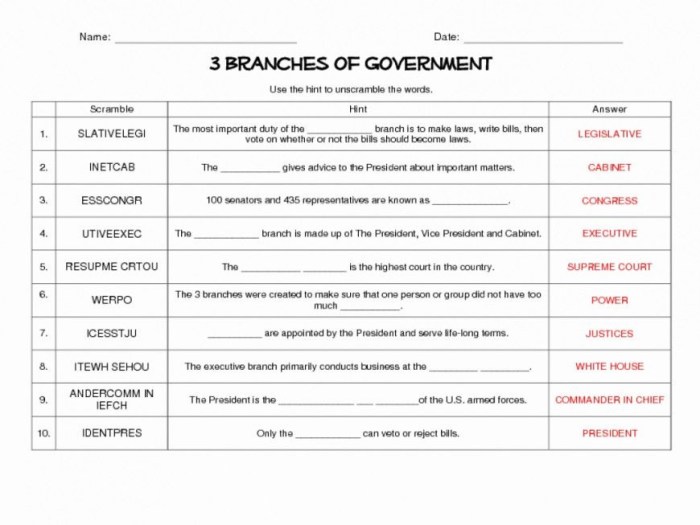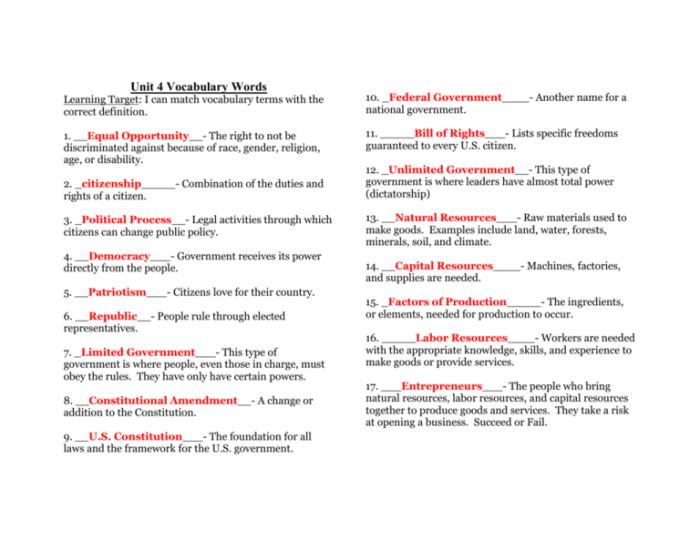Welcome to the definitive guide to icivics municipal government worksheet answers, your gateway to unlocking a comprehensive understanding of local governance. This meticulously crafted resource delves into the intricacies of municipal governments, empowering you with the knowledge to navigate the complexities of civic administration.
As we embark on this journey, we will explore the diverse types of municipal governments, unravel the roles and responsibilities they肩, and dissect their intricate structures. We will delve into the financial intricacies of municipal governance and examine the dynamic relationship between municipalities and the communities they serve.
1. Types of Municipal Governments
Municipal governments vary in their structure and organization. The three most common types are mayor-council, council-manager, and commission.
Mayor-Council Government
- Elected mayor serves as the chief executive and presides over the council.
- Council members are elected separately and serve as the legislative body.
- Advantages: Strong leadership from the mayor; clear lines of authority.
- Disadvantages: Potential for conflict between the mayor and council; mayor may have too much power.
Council-Manager Government
- Elected council appoints a professional city manager to serve as the chief executive.
- City manager is responsible for implementing council policies and managing the day-to-day operations of the city.
- Advantages: Professional management; apolitical administration.
- Disadvantages: Lack of direct accountability to voters; potential for conflict between the council and manager.
Commission Government
- Elected commissioners serve as both the executive and legislative branches of government.
- Commissioners are responsible for all aspects of city government, including policymaking and administration.
- Advantages: Efficiency; direct accountability to voters.
- Disadvantages: Lack of specialization; potential for conflict among commissioners.
2. Roles and Responsibilities of Municipal Government

Municipal governments play a vital role in providing services to their residents. These services include:
Essential Services
- Police and fire protection
- Water and sewer services
- Garbage collection
- Street maintenance
Quality-of-Life Services, Icivics municipal government worksheet answers
- Parks and recreation
- Libraries
- Community centers
- Economic development
Challenges
Municipal governments face a number of challenges in providing services, including:
- Limited funding
- Aging infrastructure
- Increasing demand for services
- Changing demographics
3. Municipal Government Structure

The typical structure of a municipal government includes the following:
Mayor
- Elected official who serves as the chief executive.
- Responsible for representing the city, setting policy priorities, and overseeing the administration.
Council Members
- Elected officials who serve as the legislative body.
- Responsible for passing laws, setting policies, and approving the budget.
City Manager
- Professional administrator who is appointed by the council.
- Responsible for implementing council policies and managing the day-to-day operations of the city.
How They Work Together
The mayor, council members, and city manager work together to govern the city. The mayor sets the agenda for the council, while the council passes laws and approves the budget. The city manager implements the council’s policies and manages the day-to-day operations of the city.
4. Municipal Government Finances: Icivics Municipal Government Worksheet Answers

Municipal governments raise revenue through a variety of sources, including:
Taxes
- Property taxes
- Sales taxes
- Income taxes
Fees and Charges
- Water and sewer fees
- Garbage collection fees
- Building permits
Other Sources
- Grants and subsidies
- Investment income
- Debt financing
Budgeting
Municipal governments budget their money to ensure that they have the resources to provide essential services and meet their other obligations. The budget process typically involves the following steps:
- Developing a spending plan
- Estimating revenues
- Balancing the budget
- Approving the budget
5. Municipal Government and the Community
Municipal governments play a vital role in the communities they serve. They provide essential services, promote economic development, and protect the environment. Municipal governments can engage with their communities through a variety of means, including:
Public Meetings
- Town hall meetings
- Council meetings
- Community workshops
Citizen Advisory Boards
- Neighborhood associations
- Business improvement districts
- Environmental commissions
Social Media
Challenges
Municipal governments face a number of challenges in engaging with their communities, including:
- Lack of citizen participation
- Misinformation and disinformation
- Political polarization
General Inquiries
What are the different types of municipal governments?
Municipal governments can be classified into three main types: mayor-council, council-manager, and commission.
What are the roles and responsibilities of municipal governments?
Municipal governments are responsible for providing essential services to their residents, such as water, sewer, police, and fire protection. They also regulate land use, zoning, and building codes.
How do municipal governments raise revenue?
Municipal governments raise revenue through a variety of sources, including property taxes, sales taxes, and user fees.